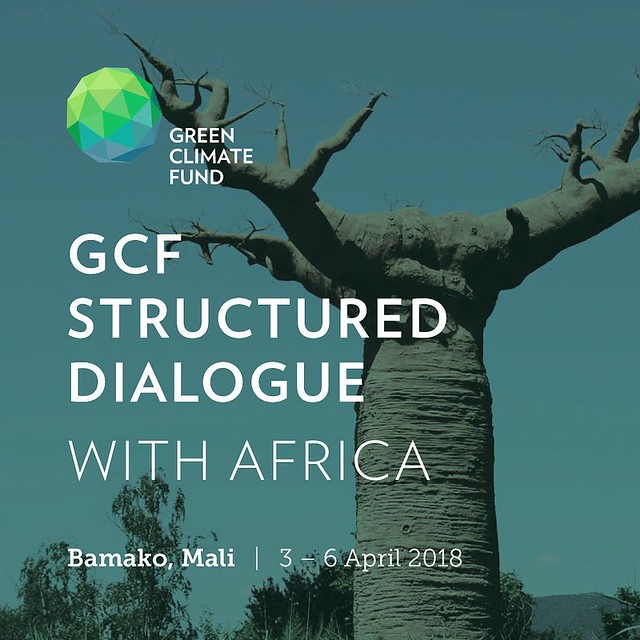Structured Dialogue with Africa
Bamako, Mali
3 - 6 April 2018
The four-day Green Climate Fund's Structured Dialogue with Africa, organised in collaboration with the Government of Mali from 3 to 6 April 2018, brought together almost 250 key stakeholders from 49 countries to increase the involvement of African countries with GCF. It also helped to accelerate the design and implementation of ambitious projects and programmes that conform with countries' climate action aspirations and to the GCF mandate. Eleven ministers and one state secretary from various countries in the region attended the high-level segment on the first day which was chaired by Mali President Ibrahim Boubacar Keïta.
Over the four days, participants appreciated the opportunity to engage in open and frank exchanges among themselves and with the GCF Secretariat on issues of high strategic importance. During the high-level segment, ministers described their countries’ visions and perspectives in transitioning Africa on a paradigm shift towards a low-emission and climate-resilient future. They also highlighted measures necessary to deal with the climate change implications of socio-economic development and investment trends in Africa.
Discussions during the Dialogue highlighted strong support for the role of GCF, amid calls for the Fund to maintain and enhance its engagement with the region. This included calls for the Fund to increase its presence in Africa.
A consistent theme during the Dialogue was that GCF should continue to provide support to help countries:
- mainstream climate risk in development agenda and macroeconomic frameworks,
- access reliable climate data and information,
- identify and overcome stumbling blocks of institutional, policy and legal frameworks,
- strengthen the capacity of National Designated Authorities (NDAs) and focal points to coordinate climate action and exchange with peers,
- build longer-term and sustainable technical expertise
- drive participatory climate action, and
- scale up climate investment, including through engagement of the private sector, to address priority areas in Africa.
The ministers pointed out these priority areas include low-emission and resilient sustainable agriculture, urbanization, waste management according to circular economy models, coastal erosion prevention, energy security and natural resource management.
The ministers, and other participants, said GCF has improved its operations during the past few years. They called on GCF to continue improving, including in reducing the time taken for responding to questions and carring out the overall approval process.
The Structured Dialogue provided participants with a wide range of interactions with GCF Secretariat staff. These included:
- Bilateral meetings of Secretariat staff with NDAs/focal points and Accredited Entities. These led to concrete progress in the development of over 25 Readiness proposals and over thirty funding proposals - including projects that will target GCF’s Simplified Approval Process (SAP). The purpose of these meetings was to improve the quality of funding proposals going to GCF, and to ensure the proposals seek improvements in the main GCF results areas.
- Presentations and meetings also led to improved participants’ understanding about the roles of country-level institutions that can become accredited to work with GCF, also called Direct Access Accredited Entity partners, and of other relevant actors, such as delivery partners and executing entities. GCF’s work with national institutions help ensure GCF projects respond to country needs. Several African institutions are currently in GCF's accreditation pipeline.
- Stronger understanding of the GCF investment framework and criteria, and of opportunities to unleash the potential of the private sector, including by tapping into the resources made available by the GCF Readiness and Preparatory Support Programme. This followed plenary and more focused workshop sessions presented by GCF operational divisions which are focusing on public sector projects, private sector projects and country engagement.
- A series of interactions between participants assisted by GCF Secretariat staff provided invaluable chances to share information about project implementation. This should help prevent problems around implementation arise in the future. Participants were also able to learn about GCF’s governance structure.







